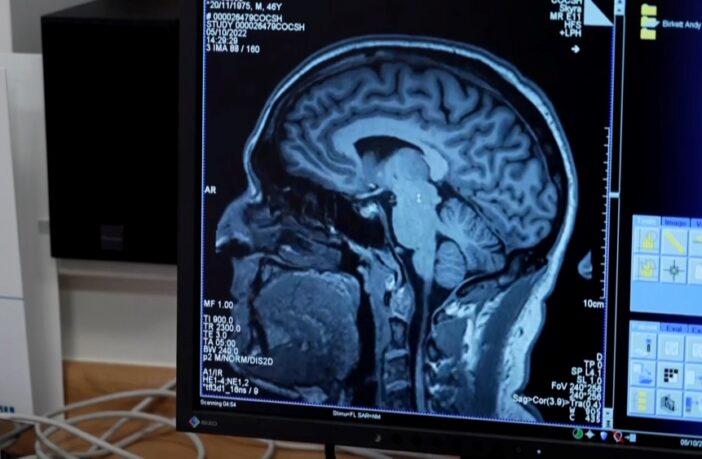An Open University academic has provided 13 brain-health hacks to help us improve our happiness and has revealed all in a short film from a series of specials produced in partnership with the BBC for the This Morning Live show on BBC One.

Dr Sinead Eccles who appeared on Morning Live
Dr Sinead Eccles is a Staff Tutor in Psychology at the OU and says that by focusing on actively increasing the four happiness chemicals in the brain and incorporating them into our everyday lives, we can all improve our own wellbeing.
The film, one of six covering a wide range of subjects proposed by OU academics, employs the help of Radio 1 DJ Katie Thistleton, who confesses at the beginning of the film that she suffers from low mood swings and anxiety.
In the film, Dr Eccles put Katie and colleagues through some exercises to help increase Dopamine (the ‘feel-good’ hormone), Oxytocin (the ‘love’ hormone), Serotonin (the ‘happy’ chemical), and Endorphin (the ‘pain reliever’ hormone) levels. Then she measured their reactions.
Dr Eccles said: “This was a truly enjoyable experience. From the beginning the BBC crew were very easy to work with, they took my lead and were very encouraging, which was a huge help to me on the day.”
To view the film and find out more on how to boost your brain chemicals visit the OU Connect web page but meanwhile, here are Dr Eccles’ 13 simple tips to help you to feel good:
If you want to increase the ‘feel-good’ hormone Dopamine:
- Engage in any activity that makes you feel happy and relaxed
- Make a daily “to do” list and delight in ticking off the tasks completed
- Try to sleep 7-9 hours a night
To increase the ‘love hormone’ Oxytocin:
- If you don’t have a pet to enjoy stroking, look at pictures of small cuddly animals that crop up on your social media feed
- Engage in physical affection simply by hugging a partner, friend or your child
- Force yourself to socialise – it might be challenging for some but it will flood your brain with Oxytocin
Increase Serotonin to improve your mood:
- Eat foods that contain tryptophan such as salmon, eggs, nuts and spinach
- Spend time outside in natural light
- Seek out activities that allow you to ‘switch off’ and relax
To increase Endorphins:
- Exercise and movement of any kind can help here but it must be something you can do consistently and enjoy.
- Laughter will flood your brain with endorphins so do/watch/enjoy activities that tickle your funny bone.
- East spicy foods and dark chocolate
- Carry out acts of kindness
The films were commissioned by Broadcast and Partnerships and are supported by the Faculty of Arts and Social Sciences with particular relevance to Psychology and Counselling
- Commissioned by Dr Caroline Ogilvie, Director, Broadcast and Partnerships
- Academic Consultants: Dr Trudi Macagnino – Eco Wins
Professor Gemma Briggs – Distracted Driving
Dr Jim Turner – Changing Your Mind
Dr Sinead Eccles – Brain Health Hacks
Professor Kesi Mahendran – Are You Extreme?
Professor Lara Frumkin – Courtroom Accents
Media Fellow: Professor Zoe Walkington
Broadcast Project Manager: Clair Robinson
Supporting Online Content: Patrick Kearney, Xinmiao Zhang, Matthew Ray and Steff Easom
Supporting Online content:
Visit our Broadcast website OU Connect where you can watch each of the films and find content exploring the films’ themes further.



